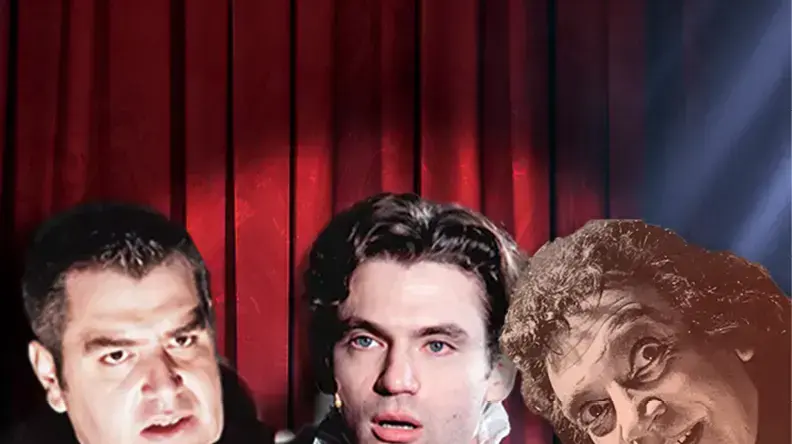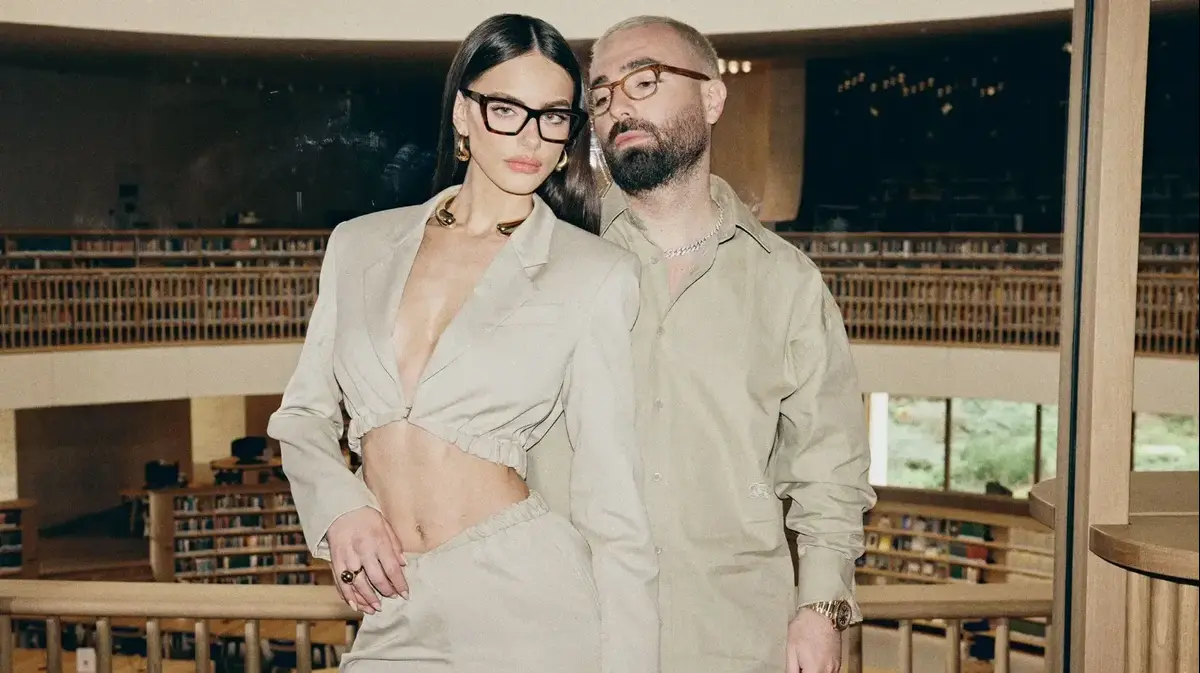"Oded Kotler did something quite rare for a theater actor. He approached the management of the Chamber and said: 'Gentlemen, I feel that I will not be able to adequately meet the requirements of the role of Hamlet'" - so reported Yedioth Ahronoth on January 25, 1966. Despite his official announcement, It later turned out that Kotler asked to retire because of a disagreement with the Polish director Konrad Sowinarski.
Indeed, a few weeks after rehearsals began, the theater management had to comply with the unimaginable request of the actor, director, and later winner of the Israel Prize: to give up the most coveted role for any actor in the world.
The veteran theater critic Michael Handelzalz wrote that Kotler is probably the only one who gave up the role in the history of the world theater.
"I have no regrets about it," Kotler said in an interview with Walla!
culture.
"By the way, this play, in which I did not act, failed miserably. Andrzej Wieda, one of the greatest Polish directors who directed his own version of the play 'Hamlet' and brought it to the Israel Festival, laughed at me for being stupid for giving up the role of 'Hamlet', because I felt that I could not fulfill the instructions of The director and doing strange things. This became known among all the actors. At the beginning of my career, I was known for not doing something, instead of being known for what I did."
Almost 460 years after William Shakespeare was born, and 420 years since he wrote "Hamlet" - the play is still considered by many to be the best in history.
In these hundreds of years it has not left the stage, countless "words, words, words" have been written about it, and there is no other play that has received so many interpretations.
Above all, it remains relevant even today.
And here is more evidence of this: these days "Hamlet" is being shown simultaneously in two large theaters in Israel - in the production that went on about a month ago by the Beit Lisin Theater directed by Yair Sherman and starring Assaf Yoness, and in the production of the stage directed by Maor Zagori and starring Ben Yosifovitch, which was first shown several years ago At the "Kibbutzim Seminar" school.
This is an opportunity to trace the prominent incarnations of the play "Hamlet" in the theater in Israel since the first version that appeared in Hebrew in 1946 until today - and check what theater critics wrote about each of the adaptations that appeared.
Shimon Finkel, The First Hebrew Hamlet, the Bima Theater in 1946 (Photo: Walla! System, courtesy of the "Bima" Archive Museum)
1946: The first Hebrew concrete rose after five years of work
"Hamlet" was staged for the first time in the Land of Israel in the Hebrew language in 1946 at Bhima, translated by Avraham Shalonsky and directed by Zvi Friedland.
The role of Hamlet was played by Shimon Finkel, who after his role was called "the first Hebrew Hamlet", and later became the artistic director of the stage and laureate of the Israel Theater Prize.
The stage worked on the play for no less than five years and the play was staged 55 times.
The actor and director Menachem Gansin, one of the founders of Bima, was very excited in a conversation with journalists at the launch of the play: "A dream of years is coming true and is coming true. It is also a bold step that is only coming true thanks to the new building. The preparatory work took a long time. The play will mark a new period in the life of Bima."
The review:
In the weekly "HaGilgal" P.
Munch in June 1946: "The director kept the conservative line in everything. He saw in 'Hamlet' only the center and not the focal point that radiates on the other actors, he breathed life into the character of Hamlet but left the other roles as backdrops that have no life of their own and it is a shame that Finkel in the role of Hamlet remained Alone, isolated at the top of his game."
On the other hand, Yaakov Horvitz in Haaretz was more complimentary: "And as for the direction - I simply have no words. I will admit and I will not be ashamed, I did not believe that this was possible, that it was possible to shorten a play with good taste and an instructive structure, without detracting from the main point. Here is the direction of a great tragedy." .
Shimon Bar and Shoshik Shani in the play "Hamlet" by the Chamber Theater, 1966 (photo: Israel Harmati, courtesy of the Chamber Theater archive)
1966: Hamlet II executed for "rape interpretation of text"
Probably the only actor in the history of world theater who gave up the role of "Hamlet".
Oded Kotler (Photo: Reuven Castro)
Exactly 20 years after the first staging of "Hamlet" in Hebrew in the Land of Israel, at Bhima, the second production of "Hamlet" was staged here, this time at Camry.
This time it was signed by the Polish director Konrad Soynarski.
After Oded Kotler stunned when he chose to give up the most coveted position himself, Shimon Bar took over.
Shoshik Shani played Ophelia and Zev Vahn played Laertes.
In addition to Kotler's story, the press also expressed surprise that the camera chose a Polish director, "while it would have been appropriate to avoid hiring an Israeli director - to bring in a British director."
The review:
Boaz Evron wrote in Yediot Ahronoth in April 1966 that "this performance of Hamlet is a tragedy of the director's conflicting intentions with the reluctant text," and believed that "here was an attempt at a new interpretation, but the play did not illustrate it (...). If a theater dares to raise "Hamlet", it is better that this be done first of all without any 'revolutionary' interpretation attempts. Only a country where this play is a permanent part of the repertoire can afford to occasionally make extraordinary interpretation experiments. Let us first get to know the play as it is."
Another harsh phrase in the criticism was "text-rape interpretation".
"True instinct of a player".
Moshe Becker (Photo: Reuven Castro)
1983: Moshe Becker closes the family circle
A foreign director was also chosen for the third "Hamlet" production in Israel, which was staged in 1983, and this time it was the director Dino Ceransko.
The translation was signed by David Avidan.
Moshe Becker was cast in the main role of the Prince of Denmark when he was only 19 years old, thus closing a circle after his mother, the actress Pnina Farah, who passed away this month, played Ophelia (alternating with Fanny Lovitch) in the first version of "Hamlet" in 1946. Beside Becker, Sassoon played in the play Gabai, Leah Koenig, Shmuel Wilojni and Alon Abutbol.
The review:
Once again, Boaz Evron killed the play in his review in Yedioth Ahronoth in January 1984, under the title "Hamlet castrated", and claimed: "The 'Hamlet' that Chernsko presents is not found in the Shakespearean text."
He also opined that the play was given a "superficial political interpretation", and that "Cernsko's great idea is so meager and stupid that when he directs most of the parts of the play (those that were not omitted or eradicated by a cruel hand) that idea disappears and is non-existent, and his direction is extremely routine".
On the Bima website, which provides reviews of plays that have been staged in the theater, they chose not to quote the killings, but did give one compliment that the critic Evron did give: "Fortunately for the play, Moshe Becker in the lead role has a real instinct as an actor and he conveys the character's pathos with great power and an unusual instinctive understanding. Thus, while still in his youth, he reached in one jump the peak of every actor's dreams and performed with honor the greatest role of all. The very fact that a young actor successfully copes with such a role fulfills him,
Young Shuli Rand and Rami Hoiberger in the play "Hamlet" by Ensemble Eitim, directed by Rana Yerushalmi, 1989 (photo: Israel Harmati, courtesy of Ensemble Eitim)
1989: The most celebrated performance of "Hamlet" in the Israeli theater
The sentence "And you recited it day and night" did not refer to Shakespeare, but this is what the young Shuli Rand did, shortly after he finished his studies at the acting studio of Nissan Netiv, in the days after the cap was removed from his head and before he was shut down for the day.
He starred as Hamlet in a production by Rana Yerushalmi, later winner of the Israel Prize for Theater, alongside Rami Hoiberger, among others.
In reality, Heiberger is a year and a half younger than Rand, but was cast as Hamlet's uncle, Claudius.
Alongside the two, who have since reached the forefront of Israeli culture, Dina Bley played the role of Ophelia and Shlomo Sadan played the role of Polonius.
The review:
The play was highly praised, and in the eyes of many in the world of Israeli theater, it is considered the best version of "Hamlet" that has been staged in Israel to date.
Shush Abigail hailed it in "Hadhot" in June 1990: "Three and a half hours of the most fascinating and real Shakespeare ever made in Israel, whose strength lies in its simplicity. Not the story about the tormented pale face, reciting sublime texts, but a story about human beings. Rina Yerushalmi produces credible and humane actors in Shalonskaite Hebrew . Shuli Rand, as Hamlet, convinces that he really loves, grieves, hesitates. This is a gem that should not be missed."
Doron Tabori in the role of Hamlet at the Haifa Theater (photo: Eyal Landsman, courtesy of the Haifa Theater)
1999: "Doron Tabori inspires admiration but not excitement"
At the beginning of 1999, "Hamlet" was staged at the Haifa Theater, directed by the British director Steven Berkoff, translated by Dory France who also wrote the music and starring Doron Tabori in the lead role, Ruthie Goldberg in the role of Ophelia and Yoram Toledano in the role of Horatio.
The play had some interesting directing decisions: it was devoid of scenery, devoid of special effects and with lighting that does not change.
The actors came on stage in evening clothes and were present on stage throughout the show.
Before her ascension Tabori said: "'Hamlet' was written out of a feeling that reality is merely a thin membrane over entire worlds outside of consciousness."
Tabori also shared that "as soon as I learned that Steven Berkoff was coming to direct 'Hamlet' here, I called the theater and offered myself."
The review:
Shush Weitz wrote in "Yediot Ahronoth" in February 1999: "Doron Tabori in the role of Hamlet fulfills Berkoff's theatrical conception perfectly. He completely controls the body, voice and facial expressions, moves from situation to situation with great flexibility and creates a character whose every detail of behavior is justified in terms of the text and the stage situation . However, Tabori lacks a measure of human warmth, which exists in the Prince of Denmark. Therefore, he manages to arouse admiration but not excitement."
This feature is characteristic of the whole show, which is very beautiful, fascinating and impressive, but rarely moving."
2005: "A 400-year-old play proves that it is more modern than us"
Itai Tiran is one of the most respected actors in the Israeli theater, and one of the most significant stations that launched him is the role of "Hamlet" in Kammeri, directed by Omri Nitzan in 2005. In the play, which was based on the translation of T.
Karmi, renovated by Dan Almagor, played alongside him, among others, Ezra Dagan, Gil Frank and Sarah von Schwarz.
The play was the big winner of the theater awards ceremony in 2006, when it garnered the highest number of awards, including the award for the play, for director Omri Nitzan and actor Itay Tiran, who in his speech thanked the audience and said: "You prove that even today Shakespeare can be a Schlager."
Nitzan said in his speech: "It is not obvious to take a 400-year-old play and prove that it is more modern than us."
The review:
Shai Bar Ya'akov wrote in 7 Nights that "This is not a classic tragedy that leads to catharsis, that liberation through identification with the hero's suffering, but an ironic, alienating and thought-provoking morality play that seeks to provoke us to re-examine the reality around us. The Hamlet of the Chamber is Definitely one of the most interesting and important shows done in the repertory theater in recent years."
Ben Yosifovich in the lead role in the play "Hamlet" by the Bhima (photo: Zarar Alon, courtesy of the "Bhima" theater)
2015: Upheaval!
Hamlet does not die at the end of the play
The creator Maor Zagori also adapted and directed his own version of "Hamlet" based on the translation of T.
Karmi
The movement and musical editing is signed by Miri Lazar and in the main role is the acclaimed actor Ben Yosifovitch.
The play was staged in 2015 at the kibbutzim seminar, and was later adopted by the Bhima Theater.
Zagori bravely chose to cast a wonderful actor who does not meet the fantasy of the beautiful and handsome prince, used a women's chorus to express Hamlet's inner voices, turned the character of Hamlet's loyal friend Horatio into a "double agent" and therefore not a true friend;
And the biggest change: while at the end of Shakespeare's play Hamlet dies, in Zagori's version he remains alive.
Reviews:
Michael Handelzaltz wrote in Haaretz in October 2015 that the show is "a fascinating improvisation by Maor Zagori on Shakespeare's Hamlet. A significant part of the impression is the movement of the actors, and especially the nine women who form a kind of chorus (...) tight theater, with a good story and a poetic text in an 'elevated' language,
Ben Yosifovich in the lead role in the play "Hamlet" by the Bhima (photo: Eli Katz, courtesy of the "Bhima" theater)
Ben Yosifovich, what makes "Hamlet", 420 years after it was written, remain timeless and relevant?
"It is a play that contains the truly deepest doubts of the soul. Shakespeare understood something about the human soul, about the confusion in it and the difficulty. The relationships, the drama and the characters in the play always touch us. That is why there are so many quotes from this play over the years, and why almost Every student who dreams of becoming an actor goes through the play in one way or another."
And with all its timelessness, is there commercial and artistic justification for putting on two plays of "Hamlet" in large theaters in Israel at the same time?
"It's like covers of songs in my eyes. We can like the same song, but everyone will like a different cover. In the end, this piece is temporary, it doesn't belong to anyone, and if we can use it to show a different theater - then cool."
Zagori scolded you when at first you didn't come to audition for the production of "Hamlet" at the kibbutz seminar.
"True. At first I didn't audition for 'Hamlet' because I had an image in my mind of how Hamlet should look. I also had in my mind that the requested casting for Prince Hamlet was a tall and thin man, and I'm not like that. Even after I did two main roles in the third year, no I thought I would get Hamlet. Then Maor came and scolded me: How dare you not be tested?! Then I was tested and things unfolded from there. It reminded me and sharpened me that there is no such thing as a right way to play a character and who is right or wrong to play a certain role. One of the things we took For our version, it's to celebrate my size, who I am and the different colors inside me. When I play Hamlet today, I feel like I'm a spoiled and gluttonous prince who eats life until he vomits himself to know."
One of the biggest changes in Zagori's adaptation of the Hamlet play is in changing his prominent character as an eternal undecider.
"If in the play Hamlet is debating whether to 'be or not to be,' then in Maor's adaptation Hamlet chooses to be," says Yosifovich, "that is, Hamlet chooses to live life strongly and fight for it. In our version, he chooses to be - for better or for worse. Hamlet here thinks that by virtue of being a prince he can and deserves to have any lust and realize any of his desires immediately, and his actions are more extreme. If Hamlet is often treated as a undecided person who does not act, then with us he acts and the struggle is between recklessness and guilt. I like the choice of light that Hamlet chooses to be And to live his life powerfully and to feel life. It's an amazing thing."
Asaf Yunesh in the lead role in the play "Hamlet" by the Beit Lisin Theater (photo: Yeshaya Feinberg, courtesy of the Beit Lisin Theater by Baruch Ivcher)
2022: Hamlet with Eyal Golan songs, bare buttocks and drugs
"Hamlet" which was performed a month ago at Beit Lisin is the last version of the play performed in Israel so far.
Hatum Yair Sherman directed the translation, and Dori Parnes translated, alongside the new star Yoness starring Rami Hoiberger, who returns after more than 30 years to play Claudius, a role he played at the beginning of his career about thirty years ago in a play by Rana Yerushalmi, as well as Eli Gorenstein, Shiri Golan, Yoram Toledano, Carmel Bin and more.
The review:
Ofri Ilani wrote in Haaretz: "Director Yair Sherman has created a contemporary, dynamic and even fun show. It has digital screens, songs by Eyal Golan, bare buttocks and lines of drugs. However, he does not pander to the audience, and maintains loyalty to the Shakespearean source for its complex twists and characters the multiples".
An excerpt from the play "Hamlet" by the Beit Lisin Theater (photo: Redi Rubinstein)
An excerpt from the play "Hamlet" by the Beit Lisin Theater, which was performed in October 2022 (Reddy Rubinstein, courtesy of the Beit Lisin Theater by Baruch Ivcher)
Assaf, "Hamlet" is the biggest play, and still - in the small Israeli theater industry, is there justification for staging two Hamlets in two large theaters at the same time?
"Yes. There is room for two plays because each one does it differently. I think there is also room for ten Hamlet plays. Two actors can share the same role in completely different ways."
Why do all the actors in the world, except Oded Kotler, want to play Hamlet?
"One of the big reasons for this is that it's a broad character. If 'Macbeth' is a tragedy of ambition, and 'Othello' is a tragedy of jealousy, 'Hamlet' can't really be defined that way. I always call 'Hamlet' - A tragedy of consciousness'".
Did you feel pressured to step into the big shoes of the role?
"I didn't walk around the street feeling happy because I was going to do the next Hamlet, I wasn't in the clouds, and because of that I couldn't crash on the floor. It allowed me to work and not be stressed by this madness. I worked with my hands and feet. It normalizes the stress."
Shimon Finkel in the monologue "To be or not to be" from "Hamlet", the stage, 1946
One of the beautiful things in Beit Lysin's version of "Hamlet" is the emphasis on the element of theater within a theater.
"When Yair told me that there would be many theatrical elements, I was very happy. The critics I like the most referred to this element in the play. This play is very theatrical both in its plot content and in its philosophical and emotional essences that deal with masks, truth and extremes. The entire design and direction of the show plays into this. We play within A rehearsal room, the stage is literally a rehearsal room. In addition to being fun for the actors, because the rehearsal room is the most fun room in the theater, I feel that it is also terribly true to the play."
In the play you wear a cardboard crown on your head.
What does this mean to you?
"Within the broad and philosophical story there is also a story that is not dealt with that much - about a guy who should be king, and the kingship was taken from him. And a cardboard crown, instead of a gold crown, is an ironic experience."
Who is the Israeli Hamlet that you liked the most, other than you?
"I only got to see Itay Tiran. I am an ardent follower of his, I grew up on him growing up in the theater. Itay has an explosive presence. He reminds me of Al Pacino in his youth. He symbolizes something I like in theater people and artists - he has an intellectual aspect. Hamlet the tyrant with me was very political. Yair and I were on the same page in Hamlet's vulnerability, loneliness and deviations. And his need for love."
culture
in what
theater
Tags
Hamlet
the stage
The Chamber Theatre
Lisin House
Haifa Theater
Oded Kotler
Moshe Becker
I'm with Tyran
Shuli Rand
Ben Yosifovich
Asaf Yunesh
William Shakespeare









